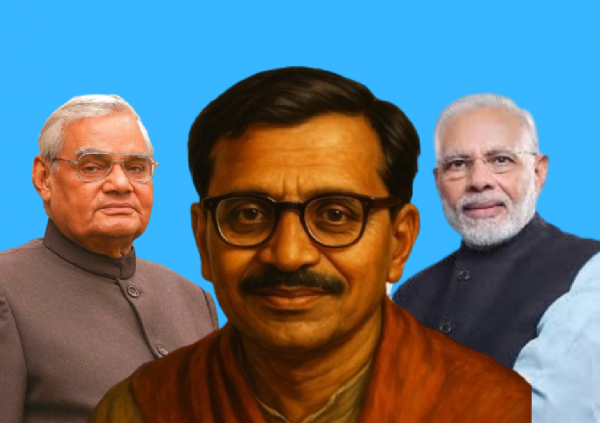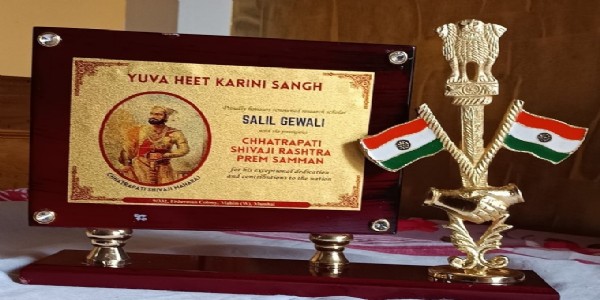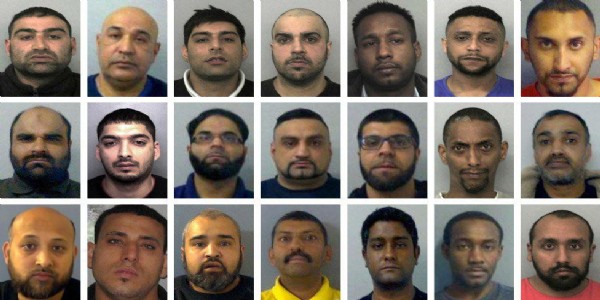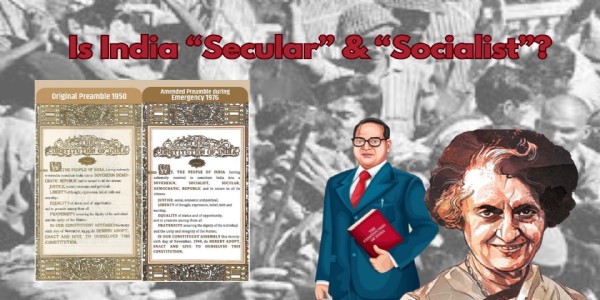From Deendayal’s Vision to Modi’s Policies: BJP’s Development Model Rooted in Integral Humanism

What is Deen Dayal Upadhyaya's Integral Humanism?
Core Tenets of Integral Humanism:
Integral Humanism in BJP Schemes
| Scheme Name | Year Launched | Launched By | Objective | Alignment with Integral Humanism | Outcome / Impact |
|---|---|---|---|---|---|
| Antyodaya Anna Yojana | 2000 | Atal Bihari Vajpayee | To provide highly subsidized food grains (35 kg rice/wheat at ₹3/₹2 per kg) to the "poorest of the poor" (Below Poverty Line) families. | Antyodaya – uplifting the last person; ensuring basic needs | 8.13 crore people have benefited till April 4, 2024 |
| Sarva Shiksha Abhiyan | 2001 | Atal Bihari Vajpayee | To achieve universalisation of elementary education for children aged 6-14 | Holistic human development through education | - |
| Pradhan Mantri Gram Sadak Yojana | 2000 | Atal Bihari Vajpayee | Provide all-weather road connectivity to unconnected villages | Infrastructure development for rural integration | As of January 2023, 96% of PMGSY I and 97% of PMGSY II targets achieved. |
| National Highways Development Project | 1998 | Atal Bihari Vajpayee | Upgrade, rehabilitate, and widen major highways | Economic growth through improved connectivity | Significant expansion of national highway network; enhanced trade and mobility. |
| Kisan Credit Card (KCC) | 1998 | Atal Bihari Vajpayee | Provide timely credit support to farmers | Empowering farmers; self-reliance | As of March 2024, the country has 7.75 crore operational KCC accounts |
| Ministry of Tribal Affairs | 1999 | Atal Bihari Vajpayee | Focus on the welfare of Scheduled Tribes | Inclusivity and cultural preservation | Implements various schemes for education, health, and economic development of tribal communities. |
| Valmiki Ambedkar Awas Yojana (VAMBAY) | 2001 | Atal Bihari Vajpayee | Provide housing for urban slum dwellers | Social justice; dignity in living | Sanctioned over 2 lakh dwelling units and community toilets. |
| Sampoorna Grameen Rozgar Yojana (SGRY) | 2001 | Atal Bihari Vajpayee | Provide wage employment and food security in rural areas | Antyodaya & Holistic Human Development | Merged into MGNREGA; enhanced rural employment. |
| Pradhan Mantri Jan Dhan Yojana (PMJDY) | 2014 | Narendra Modi | Achieve financial inclusion by opening bank accounts | Economic empowerment; access to financial services | Over 54 crore Jan Dhan Yojana accounts created, with total deposit balance of approx ₹2.39 lakh crore |
| Pradhan Mantri Ujjwala Yojana (PMUY) | 2016 | Narendra Modi | Provide LPG connections to women from BPL households | Health, dignity, and environmental sustainability | Distributed over 10 crore LPG connections; improved health outcomes. |
| Ayushman Bharat (PM-JAY) | 2018 | Narendra Modi | Health cover of ₹5L for 12.34Cr families constituting the bottom 40% of India | Holistic health care; social equity | 36 crore beneficiaries verified; significant reduction in out-of-pocket health expenses. |
| Pradhan Mantri Awas Yojana (PMAY) | 2015 | Narendra Modi | Provide affordable housing to urban and rural poor | Dignified living; social equity | 2.94 crore houses and 1.18 crore sanctioned under PMAY-R and PMAY-U |
| Pradhan Mantri MUDRA Yojana (PMMY) | 2015 | Narendra Modi | Provide micro-finance to small entrepreneurs | Economic self-reliance; support to micro-enterprises | Sanctioned over 52 crore loans worth ₹32.61 lakh crore. |
| Saubhagya Yojana | 2017 | Narendra Modi | Provide electricity to all households | Infrastructure development; quality of life | Total 2.86 crore households electrified as of 2023 |
| Swachh Bharat Abhiyan | 2014 | Narendra Modi | Eliminate open defecation and improve sanitation | Public health; dignity; harmony with nature, environmental sustainability | 12 Cr toilets built, 60 Cr benefited. |
| Stand Up India | 2016 | Narendra Modi | Promote entrepreneurship among SC/ST and women | Economic empowerment; inclusive growth | Facilitated over ₹30,000 crore in loans; boosted startup ecosystem. |
| Atal Pension Yojana (APY) | 2015 | Narendra Modi | Provide pension to unorganized sector workers | Social security; economic dignity | 7.65 Cr subscribers, ₹45,975 Cr corpus, 48% women participation as of April 2025 |
| Deen Dayal Antyodaya Yojana (DAY) | 2016 | Narendra Modi | Alleviate urban and rural poverty through skill development | Upliftment of the marginalized; economic empowerment | Mobilised 10.05 crore rural women households into over 90.90 lakh Self Help Groups |
| PM Kisan Samman Nidhi (PM-KISAN) | 2019 | Narendra Modi | Provide income support to small and marginal farmers | Farmer welfare; economic support | Over 52.68 crore beneficiaries under PM KISAN as of 2023 |
| Goods and Services Tax (GST) | 2017 | Narendra Modi | Simplify and unify the indirect tax structure | Economic efficiency; cooperative federalism, decentralisation | Increased tax compliance; broadened tax base. |
| Atmanirbhar Bharat Abhiyan | 2020 | Narendra Modi | Promote self-reliance in various sectors | Economic self-sufficiency; national resilience | Announced stimulus packages worth over ₹20 lakh crore; boosted domestic manufacturing. |
| Mission Amrit Sarovar | 2022 | Narendra Modi | Develop and rejuvenate water bodies | Environmental sustainability; water conservation | As of March 2025, over 68,000 Sarovars completed, enhancing water availability |
| Jal Jeevan Mission | 2019 | Narendra Modi | Provide tap water to all rural households | Health; infrastructure; rural development | As of March 2025, 80.2% (15.53 Cr) of 19.36 Cr rural households tap water |
| PM Janjati Adivasi Nyaya Maha Abhiyan (PM-JANMAN) | 2023 | Narendra Modi | Focus on the welfare of tribal communities | Inclusivity; cultural preservation | - |
| PM Vishwakarma Yojana | 2023 | Narendra Modi | Support traditional artisans and craftspeople | Cultural preservation; economic empowerment | As of January 2025, 27.08 lakh beneficiaries registered |
| PM SVANidhi | 2020 | Narendra Modi | Provide micro-credit to street vendors | Economic inclusion; support to informal sector | Sanctioned over 98 lakh street vendors; ₹13,789 Crores disbursed |
| PM Surya Ghar: Muft Bijli Yojana | 2024 | Narendra Modi | Provide free electricity through rooftop solar installations | Renewable energy; environmental sustainability | As of December 2024, 1.45 crore registrations and 26.38 lakh applications |
| PM Krishi Sinchai Yojana (PMKSY) | 2015 | Narendra Modi | Improve irrigation efficiency and expand water access for farmers | Sustainable agriculture; water resource management | Created irrigation facilities for over 70 lakh hectares |
| Digital India | 2015 | Narendra Modi | Transform India into a digitally empowered society and knowledge economy | Technological empowerment; inclusive growth | - |
| Sukanya Samriddhi Yojana | 2015 | Narendra Modi | Encourage savings for the education and marriage of girl child | Women empowerment; financial security | Over 4.1 crore accounts opened as of November 2024 |
With these schemes, under the leadership of Atal Bihari Vajpayee and Narendra Modi, India has witnessed a pragmatic application of Integral Humanism—where policies do not merely chase GDP figures but strive to touch every life with dignity, purpose, and opportunity. From economic empowerment to social justice, from infrastructure development to digital literacy, from tribal welfare to women's safety and financial inclusion—each initiative reflects the soul of Integral Humanism.
By grounding modern policymaking in spiritual values, cultural memory, and indigenous frameworks, BJP has offered a development paradigm that is uniquely Indian yet globally resonant. It transcends binaries of Left and Right, tradition and modernity, village and city—advancing a harmonious, inclusive, and resilient Bharat. The journey from Antyodaya to Aatmanirbharta is not just a slogan—it is the realisation of a civilisational vision where the last person is not left behind, but uplifted, empowered, and honoured.
Thus, Integral Humanism is not the past echoing into the future—it is the future arising from the soil of the past. It is India’s ideological answer to the world: that development must be human, holistic, and dharmic.
Source: Vayuveg
Bharati Web







